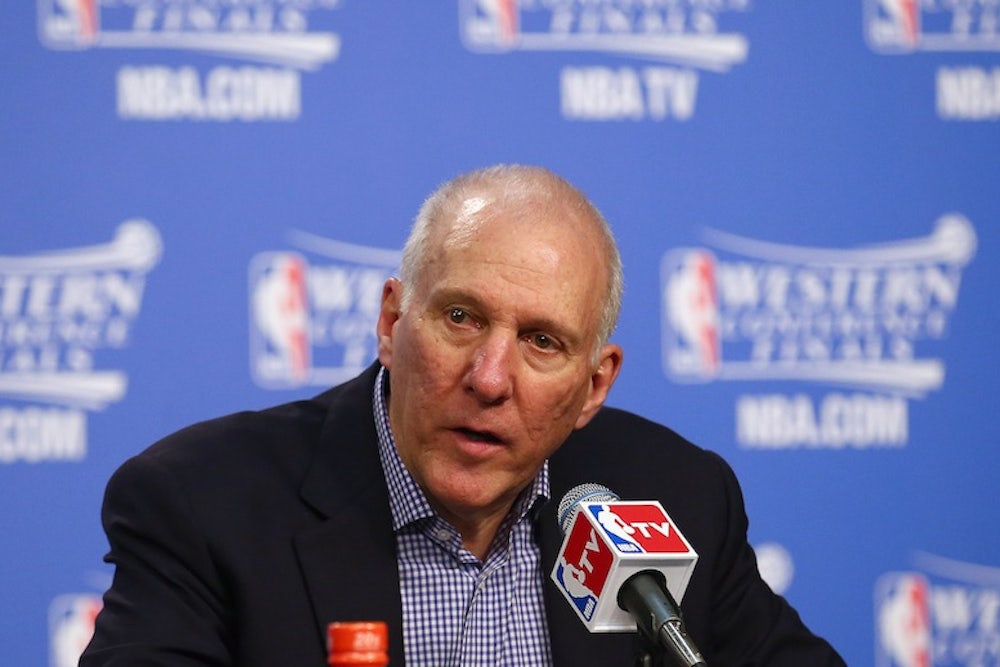The NBA Conference Finals ended when the San Antonio Spurs beat the Oklahoma City Thunder on Saturday. Previously, Miami humiliated an embarrassing Pacers team that combined an unwillingness to play hard every night with moping, grumbling, and a top player who happens to be a maniac. The result is that the Spurs and the Heat will meet in a rematch of last year's superb seven-game NBA Finals (which ended with a Heat victory). I will leave analysis of the upcoming series to smarter people, but there is one subplot that deserves more attention, and it has to do with sports journalism. (My prediction, for what it's worth: San Antonio in 7.)
"Sports journalism" is really two distinct things. The first type of sports journalism is serious journalism, and covers (for example) corruption, the business of sports, and illegal doping. It also touches on issues of race, class, and gender, which all intersect with sports. The New York Times's front-page article on Sunday about soccer corruption is a good example of serious sports journalism.
But then there is another type of sports journalism, which consists of post game press-conferences ("why did your team lose tonight?") mid-game interviews ("what can your team do to win in the second half?") and the endless number of predictions that make sports fandom so fun (see above). Surely it's true that even ostensibly "serious" journalists who cover national security also occasionally engage in less momentous assignments. But the strange thing about sports is that journalists who occasionally write on serious topics are engaging in this second kind of journalism all the time. And the latter only has one benefit: bringing joy to sports fans.
How does this relate to the upcoming NBA Finals? Well, the Spurs are coached by Gregg Popovich, who has won four titles in San Antonio and is arguably the best coach in professional sports. Popovich is an undeniably appealing figure who is adored and respected by his players and peers. But he is also crusty and occasionally rude with the media. Now that coaches are required to talk to sideline reporters once during every playoff game for on-air interviews, Popovich has become famous for rather rudely dismissing questions. (Here is a montage of his best/worst moments.) At press conferences he is often equally cold, whether mocking questions, giving one-word answers, or simply denying the premise of various statements posed to him. (Popovich's classiness, however, was on display when a sideline reporter's son asked him questions at a recent game; the reporter himself was recovering from Leukemia treament.)
The response from some in the media is that Popovich's frustrations are occasionally understandable, but that journalists are just doing their jobs, and he should therefore be more open. (For a long discussion of the issue, I suggest listening to this Grantland podcast between Zach Lowe and ESPN reporter Doris Burke. Burke is on the receiving end of many of Popovich's one-word answers linked to above.)
But Popovich is not denigrating serious reporting. Instead he is showing his contempt for the other kind of sports journalism. In my opinion, this type of journalism is completely acceptable (I wish someone paid me to produce it!), and even though the quality of much of it is abysmal, the sheer amount of commentary and speculation makes sports endlessly compelling. But when journalists engage in this type of work, they shouldn't pretend like they are performing some sort of public good and they probably should find a different word for what they are doing. If Gregg Popovich doesn't want to answer stupid questions at a press conference, no real harm is done. When a president or senator doesn't want to answer questions, public interests are potentially being harmed.
Earlier in the season, Kelly Dwyer of Yahoo Sports wrote a column riffing on some student journalists who went to visit Popovich. Informed who they were, Popovich jokingly told someone to keep the kids away from him, or "they will want to change their majors." Dwyer was actually complimentary towards Popovich, but his column made the mistake of thinking that what kids learn at journalism school does (or should) have some relation to the types of questions Gregg Popovich dislikes answering. In fact, there is almost no connection between the two. There is nothing ignoble about analyzing sporting events or asking players about their shot selection. But let's not act as if it is part of some higher calling.
